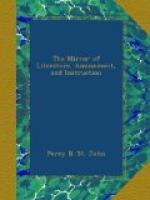Before they commenced bathing in the Thermae, the Romans anointed themselves with oil, in a room especially appropriated to the purpose; and oil was again applied, with the addition of perfumes, on quitting the bath. In a painting which has been engraved from one of the walls in the baths of Titus, the room is represented filled with a number of vases, and somewhat resembles an apothecary’s shop. These vases contained a variety of balsamic and oleaceous compositions for the anointment, which, when ultimately performed, prepared the bathers for the sphaeristerium, in which various amusements and exercises were enjoyed. The subsequent operation of scraping the body with the strigil has given way to a mode of freeing the body from perspiration and all extraneous matter, by a sort of bag or glove of camel’s hair, which is used in Turkey; while flannel and brushes are substituted in other parts.
The vapour-baths now used in Russia resemble very much those among the ancient Romans. These are generally rudely built of wood, over an oven, and the bathers receive the vapour at the requisite heat, reclining on wooden benches,—while, more powerfully to excite perspiration, they whip their bodies with birch boughs, and also use powerful friction. They then wash themselves; and, as these vapour-baths are often constructed on the banks of a river, throw themselves from the land into the water; or sometimes, by way of variety, plunge into snow, and roll themselves therein. This violent exercise and sudden transition of temperature is almost overpowering to persons unhabituated to the custom, and will oftentimes produce fainting,—though the patient, on recovering, finds himself refreshed, and experiences a delightful sense of mental, as well as bodily, vigour and energy. The enervating effects of the extreme luxury and refinement practised in the Greek and Roman baths are obviated in the Russian mode: to which may partly be ascribed the power which the latter people have in undergoing fatigue and the various hardships of their rigorous climate. Tooke says that without doubt the Russians owe their longevity, robust health, their little disposition to fatal complaints, and, above all, their happy and cheerful temper, mostly to these vapour-baths. Lewis and Clarke, in their voyage up the Missouri, have noticed the use of the vapour-bath in a somewhat similar contrivance to the Russians among the savage tribes of America;—so it appears that this effectual promoter of cleanliness is one of the most simple, original, and natural, that can be employed for that paramount duty.
C.R.S.
[7] Culverwell on Bathing.
[8] [Greek: thermai]—hot springs.
[9] These baths, impregnated
with medicinal herbs, and other
preparations,
are at the present day gaining great repute for
the
cure of cutaneous diseases, and other complaints.
* * * * *




